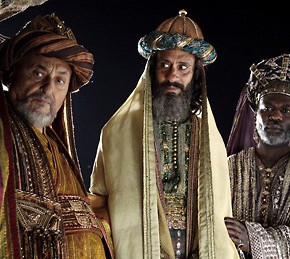
Journey of the Magi
T.S. Eliot
‘A cold coming we had of it,
Just the worst time of the year
For a journey, and such a long journey:
The ways deep and the weather sharp,
The very dead of winter.’
And the camels galled, sorefooted, refractory,
Lying down in the melting snow.
There were times we regretted
The summer palaces on slopes, the terraces,
And the silken girls bringing sherbet.
Then the camel men cursing and grumbling
and running away, and wanting their liquor and women,
And the night-fires going out, and the lack of shelters,
And the cities hostile and the towns unfriendly
And the villages dirty and charging high prices:
A hard time we had of it.
At the end we preferred to travel all night,
Sleeping in snatches,
With the voices singing in our ears, saying
That this was all folly.Then at dawn we came down to a temperate valley,
Wet, below the snow line, smelling of vegetation;
With a running stream and a water-mill beating the darkness,
And three trees on the low sky,
And an old white horse galloped away in the meadow.
Then we came to a tavern with vine-leaves over the lintel,
Six hands at an open door dicing for pieces of silver,
And feet kicking the empty wine-skins.
But there was no information, and so we continued
And arrived at evening, not a moment too soon
Finding the place; it was (you might say) satisfactory.All this was a long time ago, I remember,
And I would do it again, but set down
This set down
This: were we led all that way for
Birth or Death? There was a Birth, certainly
We had evidence and no doubt. I had seen birth and death,
But had thought they were different; this Birth was
Hard and bitter agony for us, like Death, our death.
We returned to our places, these Kingdoms,
But no longer at ease here, in the old dispensation,
With an alien people clutching their gods.
I should be glad of another death.
“And having been warned in a dream not to return to Herod, they left for their own country by another road.” (Matthew 2:12)
In the lead up to Christmas, the Economist published “The rule of three” on the origin of the Magi in modern culture. Despite the Malcolm Gladwellesque title and the typically not-so-human-interesty themes of most of the publication’s articles, this piece delved light-heartedly into everything behind the beloved tale: from its biblical beginnings and medieval embellishments to the three stooges. “Of all the actors in the Nativity story, the three wise men are by far the most fun. To a scene that would otherwise verge on the gloomy—a hazardous birth, a stroppy landlord, a derelict stable, uncouth shepherds—they add glitter and mystery.” Throw in the Massacre of the Innocents and the holy family’s flight to Egypt that follows this vignette, an unpleasant portion not so popular in most modern Christmas celebrations, and it’s no wonder that the Magi are often seen as an opportunity for comic relief. One can look no further than Catherine Hardwicke’s 2006 film adaptation, The Nativity Story, to see how these sometimes goofy depictions of the Magi can add much-needed levity to such a weighty story.
But for Eliot, the Magi served as something more than festive comic relief. The Economist article claims, “T.S. Eliot, filled with the anomie of his age, did his best to drab the wise men down,” citing the first stanza in particular (which was actually adapted by Eliot from a 1622 Christmas sermon by Bishop Lancelot Andrews). But this description of ‘anomie’ (adriftness, disillusionment) is not because Eliot’s language lacks any humility or humor. At times he seems to even poke fun at his own bourgeois sensibilities when the Magi find their accommodations, “(you may say) satisfactory.” No, rather this sense of gravity comes from Eliot conceiving in his poem a metaphor for the Christian journey with which we can all identify. Whether it comes after reading the Gospels for the first time, or tenth time, or finally making a New Year’s resolution, there is an expectation to stick with something, to establish a dichotomy in one’s life between old and the new, to ‘go by another road.’ We are simultaneously dissatisfied by our old modes, our deep-set habits, our ‘old dispensations,’ yet at the same time find in these new expectations a ‘bitter agony.’ An agony leading Eliot’s Magi to ‘be glad of another death,’ not the death of the old self, perhaps not even mortal death and deliverance, but the grace afforded by Christ’s death on the cross.

COMMENTS
One response to “Eliot’s Journey of the Magi and Our Discomfort with Choosing Another Way in 2015”
Leave a Reply














For another version, try John Peale Bishop’s “Twelfth Night.” for yet a different, and startling view.